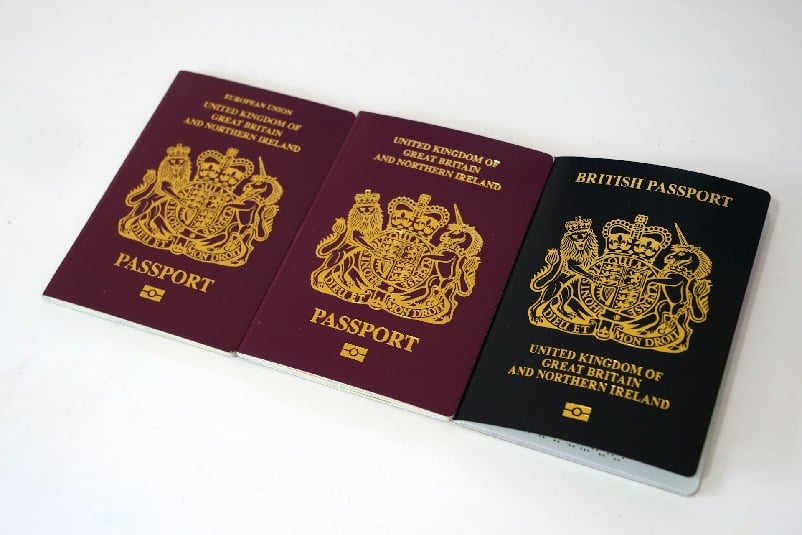Disadvantages of Dual Citizenship in UK
Dual citizenship has many benefits, most notably granting citizenship privileges from two countries. However, it has some disadvantages, which could lead to severe consequences if not managed.
Contact an IAS lawyer to learn more about the disadvantages of dual citizenship in the UK and for immediate help with your UK citizenship application. Call us at +44 (0)333 414 9244 or contact us online.
Dual Citizenship in the UK: An Overview
https://iasservices.org.uk/british-dual-nationality/Dual citizenship, also known as dual nationality, is a legal status that allows an individual to be a citizen of two countries simultaneously. The rules governing dual citizenship vary across different countries, with some nations not permitting their citizens to hold a second nationality.
However, in the UK, a British citizen can seek foreign citizenship without renouncing their British nationality. Similarly, a foreign national can become a British citizen without giving up their original nationality, provided their home country allows dual citizenship.
UK dual nationality grants its holders certain benefits. Individuals can enjoy the right to reside, work, and study in the UK and their second country of nationality. They can also vote and contest in UK elections and access public benefits.
Having two passports allows greater flexibility for travel, particularly when one passport offers visa-free or easier entry into certain countries. For instance, a UK passport allows visa-free travel to nearly 150 countries.
Disadvantages of Dual Citizenship in the UK
While dual citizenship offers several benefits, there are certain disadvantages associated with it, and they include the following:
Double Taxation
If you hold British dual citizenship and you reside in the UK, the government will tax you on all income you earn. However, if you permanently reside abroad, you only need to pay taxes on income earned in the UK.
Your other country of citizenship might have stricter tax laws, including taxing you on worldwide income, irrespective of where you permanently reside. Thus, you may be subject to double taxation.
The UK government has tax treaties with over 150 countries that prevent dual nationals from being taxed twice on the same income. If your other country of citizenship has such an agreement with the UK, you can claim full or partial tax relief. The type of relief you are eligible for depends on the specifics of the treaty between the UK and your other country of citizenship.
If your country does not have a tax treaty with the UK, it is possible to offset some of your taxes via a tax credit. You can obtain a tax credit from the government of your other country, and if accepted by the UK authorities, they would offer you a reduced rate based on the amount you pay abroad.
Limited Embassy Assistance
The UK government provides diplomatic assistance to citizens abroad via the Foreign, Commonwealth and Development Office (FCDO). This assistance includes:
- Information about the host country’s legal and judicial system and recommendations on where to get legal help
- Contact information of the law enforcement and medical services for victims of crime or sexual or violent assault.
- Assistance during medical emergencies
- Making arrangements to inform a late person’s UK family about their family member’s status
- Repatriation during a natural disaster or conflict.
However, if a dual citizen is in their other country of citizenship, the UK government will not offer them diplomatic protection or consular assistance. For instance, if you have dual citizenship with the UK and the US and experience issues while in the US, the British embassy would not intervene.
Fewer Job Prospects
Dual citizens may experience challenges getting some types of jobs, particularly in security and defence. These roles typically require security clearance and access to classified information or involve national interests, and obtaining dual citizenship might cause a conflict of interest or hinder an individual’s ability to fulfil their duties objectively. British citizens with dual nationality are only eligible for such roles if they pass the appropriate level of security clearance.
Similarly, individuals who acquire dual citizenship may be restricted from participating in military service. The UK government allows dual nationals to undertake military service only if they are not required to participate in mandatory military service in their other country of citizenship now or in the future.
Therefore, holders of dual citizenship in the UK and a nation that requires mandatory military service might reconsider serving in His Majesty’s Armed Forces to avoid issues.
Possible Loss of Citizenship
While the UK allows and recognises dual citizenship, not all countries do. Some nations require citizens to renounce their original citizenship when acquiring British citizenship, while others have laws that automatically revoke citizenship when a person acquires a second nationality.
Countries such as China, India, Japan, and Saudi Arabia generally do not accept dual citizenship, meaning individuals from these nations may have to choose between their original nationality and UK citizenship.
Similarly, UK nationals who intend to acquire a second citizenship from countries with such restrictive laws would have to renounce their British citizenship.
Beauracratic Complexities
Holding two nationalities can mean dealing with additional administrative and legal requirements, such as:
- Renewing two passports.
- Filing tax returns in multiple countries, if required.
- Complying with reporting requirements, such as foreign bank account disclosures.
Visa requirements also differ depending on which passport an individual travels with. Meeting deadlines for renewals, tax filings, and other additional obligations can be challenging..
Tips for Navigating the Challenges of Dual Citizenship
Here are some essential tips that can help you navigate the challenges associated with dual citizenship:
Work with an Immigration Lawyer
Consulting an immigration lawyer can provide expert insight into how UK dual citizenship interacts with the laws of your other country of nationality. They can educate you on your rights and responsibilities as a dual citizen and assist with citizenship applications and renewals.
An immigration lawyer will also help you avoid legal pitfalls, such as potential loss of citizenship. Furthermore, they can help you explore tax reliefs, obtain tax credits, or explore other legal ways to ensure you do not overpay in taxes.
Keep Organised Records
As a dual citizen, you must ensure your passports remain valid and renew them before expiration. You should also use the correct passport when entering or leaving a country to comply with border regulations.
You must maintain clear records of income and assets in both countries. Keep copies of tax returns, bank statements, and financial transactions for reference.
Declare Your Status During Job Applications
When applying for jobs, especially in government roles or sectors with security restrictions, your dual citizenship status may be a factor in the hiring process. To manage this effectively, check job requirements carefully before applying and be honest about your citizenship status during applications to avoid legal complications later.
Monitor Policy Changes
Immigration and nationality laws can change, sometimes impacting dual citizenship rights. For instance, Norway enacted a policy change in 2020, allowing dual citizenship after previously prohibiting it.
How Can IAS Help?
The concept of dual citizenship is intricate, especially considering that dual-citizenship countries often have differing nationality laws and obligations. Balancing them can be challenging. At IAS, our expert immigration lawyers are available to support you every step of the way.
We assist with all aspects of the UK dual citizenship application process, from reviewing your eligibility and organising necessary documents to preparing and submitting your application to the Home Office. If you are concerned about tax obligations, our team can assess your eligibility for tax relief and advise you on compliance to help you avoid legal issues.
For those seeking employment, we can help you understand your eligibility for different roles and navigate any restrictions related to dual citizenship. Understanding your rights as a UK dual citizen is essential to making the most of your status, and our experts are ready to provide clear guidance on residency and work rights.
Additionally, we offer travel advice to ensure you have the proper documents and avoid border complications when moving between countries. If renouncing one of your citizenships becomes necessary, we can also assist with the legal renunciation process.
Regardless of your concerns, our lawyers at IAS can provide tailored solutions. Call us at +44 (0)333 414 9244 or contact us online for immediate help with your immigration situation.
Table of Contents
Table of Contents will appear here.Legal Disclaimer
The information provided is for general informational purposes only and does not constitute legal advice. While we make every effort to ensure accuracy, the law may change, and the information may not reflect the most current legal developments. No warranty is given regarding the accuracy or completeness of the information, and we do not accept liability in such cases. We recommend consulting with a qualified lawyer at Immigration Advice Service before making any decisions based on the content provided.
Services we Provide
Frequently Asked Questions
No, you cannot hold citizenship in the UK and India because Indian nationality laws do not permit dual citizenship. However, you may be eligible for an Overseas Citizen of India (OCI) status, which is available to persons of Indian origin and grants you a lifetime, multiple-entry visa to India, among other benefits.
The UK authorities do not mandate that British citizens declare dual nationality when they obtain citizenship in another country. However, foreign nationals intending to obtain British citizenship will need to declare their status as part of their application.
You do not need to submit your foreign passport to the authorities when renewing your British passport. You only need to submit your current passport and other supporting documents.
















